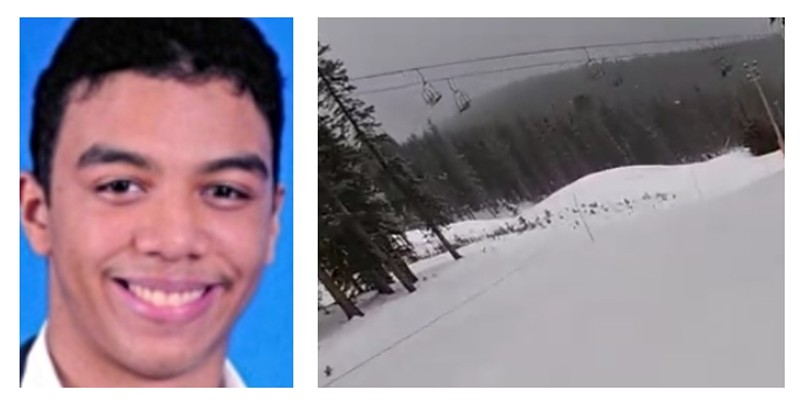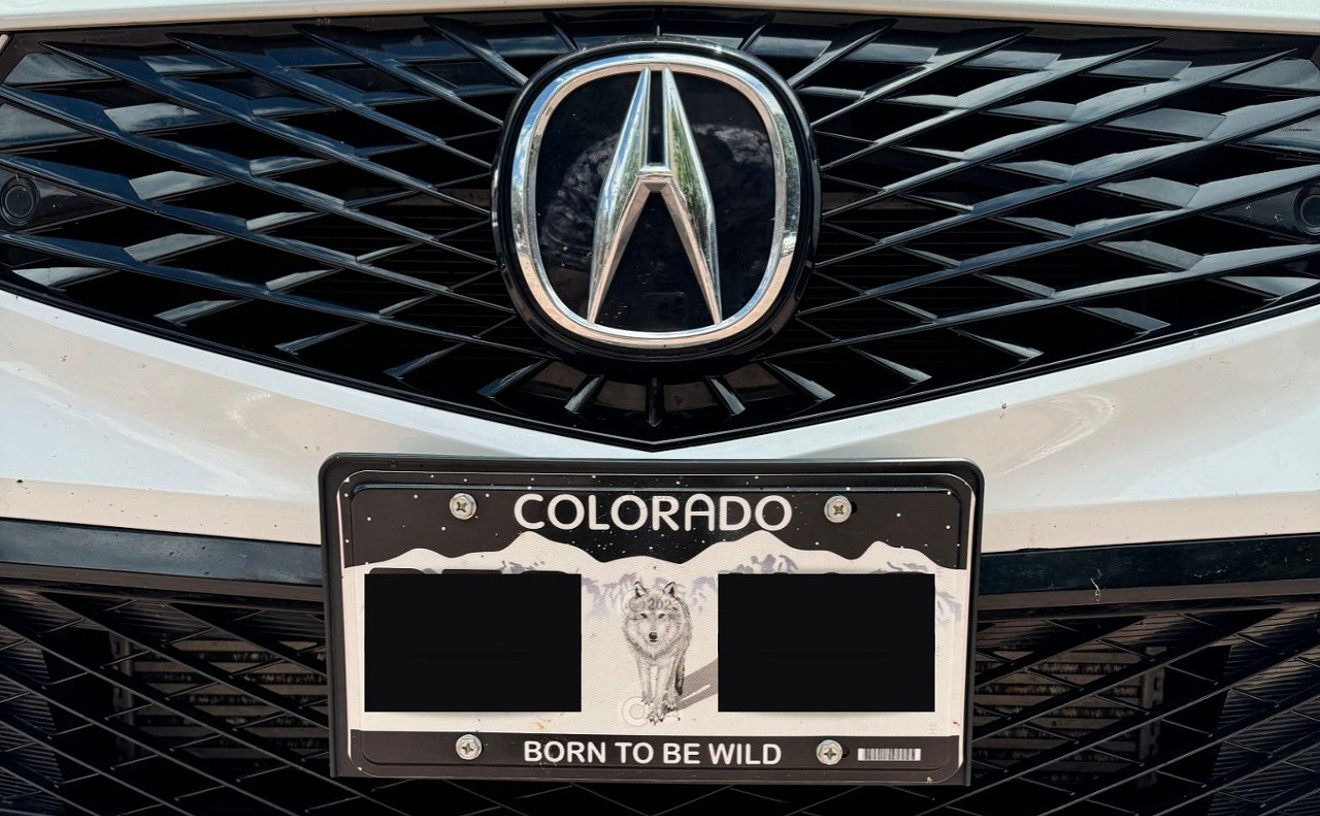Although everything about the incident was tragic, Mañon's death appears to have gone unreported for months, until a March 23 Colorado Sun article previewed a new bill about transparency related to ski resort accidents and safety plans. The measure will be discussed by a Colorado Legislature committee today, April 15, and Danilda Streeb, Mañon's aunt, who lives in Denver and is still reeling from her nephew's passing, supports it wholeheartedly, even as she expresses astonishment that such mandates aren't already in place.
"It is just the absolute minimum that an industry should have a standard of care, the same way any other industry has," Streeb says. "But when you send your child to take ski lessons, you have absolutely no idea what the ski area is going to implement if the child gets injured, and that it's not going to get reported so others understand what happened and the risk involved."
Last December, Streeb explains, "my sister and brother and my nephew, Etthan, were visiting from the Dominican Republic, and my husband took a bunch of them skiing to Echo Mountain in Clear Creek County. They did the first run on the bunny hill, and my nephew was doing just fine, so he and my husband decided to try the main run, which was the only other one open. But I guess Etthan got up too much speed, and he crashed at the base of the run and flew 45 feet into the trees."
Streeb's husband "rushed down there," she continues, "and the ski patrol told him, 'Oh, this happens all the time,' which raises one of our biggest concerns: Why has nothing been done about this if it happens all the time? That refers to safety plans and accident reporting, and if a third party should have been overseeing these types of reports and accidents and realizing there are too many people crashing at the base of the run and going into the trees."
According to Streeb, Mañon suffered a broken arm and leg and likely was experiencing internal bleeding. By her estimate, "he lost a liter or two of blood," yet it took rescuers "an hour and ten minutes to get him out of there, and then it took another 25 minutes to assess him before they left — and ten minutes later, he died in the back of the ambulance."
In the weeks and months that followed Mañon's death, Streeb and other family members were able to obtain the original 911 call made after the accident by Fred Klaas, Echo Mountain's general manager. "They specifically asked him, 'Do you know anything about the accident? Can you give us some information?' He said, 'I'll call back,' but he never called back," she says. "The paramedics said in their reports, 'We have not received any information from the resort about what happened.' And we still don't know why Flight for Life wasn't called, or even if a helicopter can land at the resort."
Asked about Streeb's account, Klaas replies: "It's difficult to respond to some of the statements without sharing more specific or extensive details, and to be honest, I don't feel like this is our story to tell. As such, I'm going to let Etthan's family determine what they'd like shared publicly."
Klaas adds: "We are terribly saddened by what occurred, and we recognize that this has to be an incredibly difficult time for his family and friends. We continue to send our deepest sympathies, support, prayers and thoughts to all those impacted."
In the wake of her nephew's death, Streeb was stunned to learn that ski resorts in Colorado aren't required to share accident information or make their safety plans publicly accessible. "We assumed this was just part of the status quo," she says. "It was a huge slap in the face to find out, and I'm sure a lot of Coloradans don't know that."
Indeed, the best current information about ski-injury accidents was gathered by Safe Slopes Colorado, an advocacy group that shared its findings with Westword last December. Data from the Colorado Department of Public Health and Environment revealed that during the 2018-2019 ski season, ski accidents resulted in more than 8,000 emergency-room visits and nearly 1,600 ambulance transports. For an average 120-day season, that broke down to 66 trips to the ER and thirteen ambulance rides related to skiing every single day.
Like Streeb, Safe Slopes Colorado backs Senate Bill 21-184, dubbed "Ski Area Safety Plans and Accident Reporting" and subtitled: "Concerning ski area safety, and, in connection therewith, requiring the operators of ski areas to adopt and disclose safety plans, disclose seasonal ski accident statistics, and maintain an accident database."
The bill's summary notes that it updates Colorado's Ski Safety Act of 1979 in the following ways:
• Requiring each ski area to adopt and publish, in printed form and on the ski area's website, if any, a safety plan specifying the governance, management, and operational roles, responsibilities, and practices of the ski area to prevent accidents and reduce the frequency and severity of injuries; andBecause the bill is state-specific, David Byrd of the Lakewood-based National Ski Areas Association deferred comment to Colorado Ski Country USA, an NSAA member devoted to the industry in this state. According to the statement provided by spokesperson Chris Linsmayer: "Colorado Ski Country USA and our members are concerned about the wide-ranging implications of this bill and are opposed. We look forward to debating it at the Colorado legislature."
• Requiring ski areas with an elevation drop of 500 feet or more and at least one elevated lift to:
• Collect and disseminate seasonal data on ski and snowboard accidents and deaths, including those occurring while boarding or exiting lifts; and
• Collect and make available, upon request, specific information about each accident, including where and when it occurred, the conditions at the time, the type of injuries and whether death occurred on site or following medical transport, and specified non-private information about the injured person.
• The bill makes any failure to create, maintain, and publish a safety plan or provide the required reports or data grounds for discipline by the passenger tramway safety board.
When he was still a member of Congress, Jared Polis appeared to support the goals of the proposed legislation. A 2017 statement Polis's office supplied to Westword reads: "Safety and transparency for our federal lands should be our top priority. I think improving reporting requirements and transparency in the leases under which operators use our public land including White River National Forest can help increase consumer confidence and encourage safety. People should be able to look at basic safety data when they are deciding where to ski." But as governor, Polis has not taken a position on SB 21-184.
The bill has a powerful sponsor, Senator Jessie Danielson, a Democrat from Wheat Ridge — and Dems hold a 3-2 majority in the Agriculture and Natural Resources Committee, which is hearing the bill today. But the ski industry is incredibly powerful as well as generous, as evidenced by information accessed by journalist Kevin Fixler, who authored an April 14 op-ed about ski-area transparency for the Colorado Freedom of Information Coalition. (Disclosure: I'm quoted in the article.) In information shared with Westword, Fixler documents donations from Colorado Ski Country USA to every other member of the committee aside from Danielson. Moreover, Senator Kerry Donovan, the Democratic chair of the committee, also received donations from the Vail Resorts Employee Political Action Committee and individual Vail Resorts employees.
The amount of money Donovan collected from these sources isn't huge; the total stretching back to 2014 is less than $1,500. But when Fixler spoke with her, Donovan's comments suggested that getting her approval won't be easy. "I have concerns about the bill," she told him. "I feel like I understand some of the goals that the bill’s sponsors are trying to achieve, but I’m just not confident this bill is the pathway toward those goals."
"Colorado is a state that holds a really big and important role in skiing around the world," Streeb counters. "It is our responsibility to show leadership. It is our responsibility to provide the path for others to follow. It is common sense, and we can do better."
The Agriculture and Natural Resources Committee hearing begins at 1:30 p.m. today, April 15, in the Old Supreme Court building.












